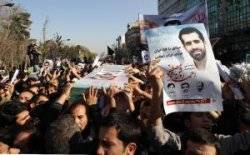Iran says it has evidence the US was behind the killing of one of its nuclear scientists, according to Iranian state television.
US officials last week denied any role in the killing of Mostafa Ahmadi-Roshan, and condemned the bomb attack which claimed his life in Tehran on Wednesday.
However, Iran's state TV reported that the Iranian foreign ministry had, in a letter handed to the Swiss ambassador in Tehran, said : "We have reliable documents and evidence that this terrorist act was planned, guided and supported by the CIA."
The Swiss embassy represents US interests in a country where the US has no diplomatic ties.
Massoud Jazayeri, the spokesman for Iran's Joint Armed Forces Staff, said: "Our enemies, especially America , Britain and the Zionist regime [Israel], have to be held responsible for their actions."
In the fifth attack of its kind in two years, a magnetic bomb was attached to the door of 32-year-old Roshan's car during the morning rush-hour in the Iranian capital. His driver was also killed.
Hillary Clinton, the US secretary of state, denied responsibility while Shimon Peres, the Israeli president, said his country had no role in the attack, to the best of his knowledge.
Iran in the past has accused Israel of causing a series of spectacular and sometimes bloody mishaps to its nuclear programme.
Israeli officials do not comment on any involvement in those events, although some have publicly expressed
Iranian state TV said a " satisfaction at the setbacks.
letter of condemnation" had also been sent to Britain, saying the killing of Iranian nuclear scientists began after the head of Britain's MI6 spy service announced intelligence operations against states seeking nuclear weapons.
The West says Iran's nuclear programme is aimed at building a bomb. Tehran says it has the right to peaceful nuclear power.
War of words
Iran has urged the UN Security Council and Ban Ki-moon, the UN secretary-general, to condemn the latest killing.
Recent incidents have deepened an already tense war of words between the US and Iran, as the US steadily ratchets up sanctions on Iran with the aim of fracturing its oil-dependent economy in a bid to halt its nuclear programme.
Barack Obama, the US president, signed new measures on New Year's Eve that, if fully implemented, would make it impossible for most countries to pay for Iranian oil.
The European Union is expected to unveil similar measures next week, and announce a gradual oil embargo among its member states, who collectively buy about a fifth of Iran's exports.
Iran has responded to threats of sanctions by saying it could close the Strait of Hormuz, the gateway to the Gulf, potentially blocking the maritime flow of 20 per cent of the world's oil.
At the same time, the US and Israel have not ruled out military action if diplomacy fails to resolve the nuclear dispute. Iran says it would retaliate if attacked.
PHOTO CAPTION
Iranian mourners carry the coffin of nuclear scientist Mostafa Ahmadi-Roshan during his funeral in Tehran on January 13 .
Aljazeera


 Home
Home Discover Islam
Discover Islam Quran Recitations
Quran Recitations Lectures
Lectures
 Fatwa
Fatwa Articles
Articles Fiqh
Fiqh E-Books
E-Books Boys & Girls
Boys & Girls  Articles
Articles










